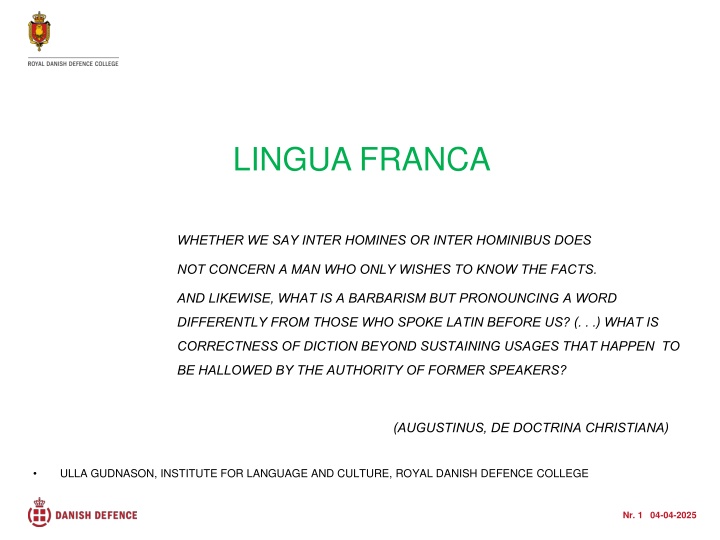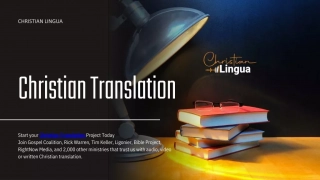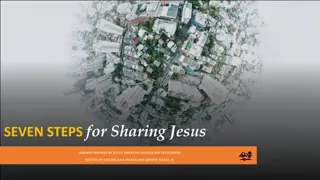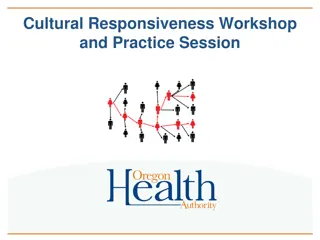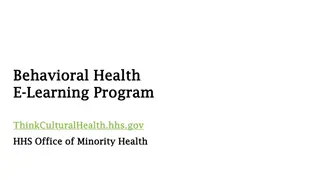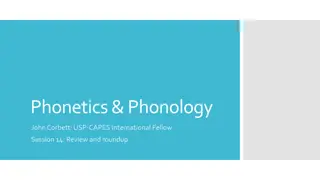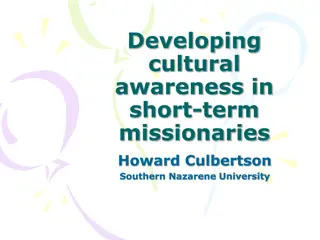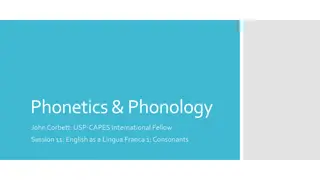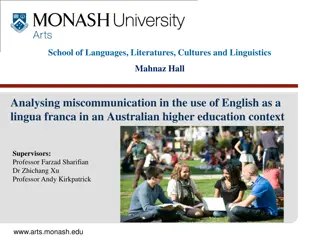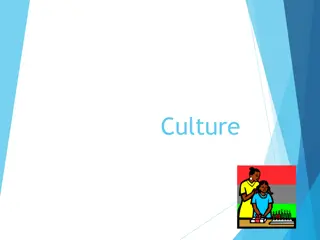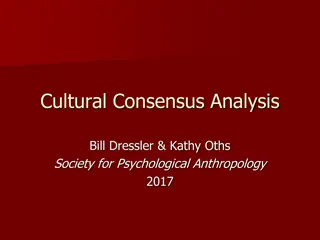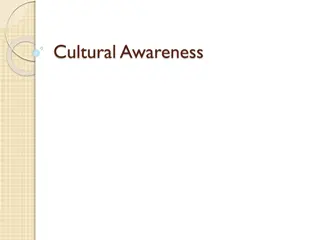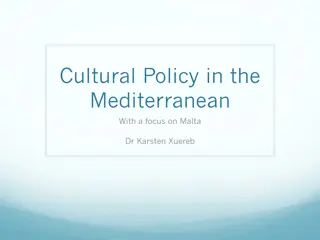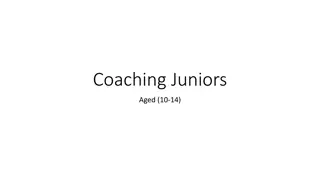LINGUA FRANCA: The Stanag and English Cultural Awareness
Lingua Franca, as discussed in the content, delves into the use of English as a global auxiliary language, the necessity of cultural awareness in a globalized world, motivations behind ELF speakers, and features considered acceptable in ELF communication. The text also touches on research efforts related to ELF, including the use of corpora and phonetics. It emphasizes the importance of effective communication and understanding in multilingual interactions.
Download Presentation

Please find below an Image/Link to download the presentation.
The content on the website is provided AS IS for your information and personal use only. It may not be sold, licensed, or shared on other websites without obtaining consent from the author.If you encounter any issues during the download, it is possible that the publisher has removed the file from their server.
You are allowed to download the files provided on this website for personal or commercial use, subject to the condition that they are used lawfully. All files are the property of their respective owners.
The content on the website is provided AS IS for your information and personal use only. It may not be sold, licensed, or shared on other websites without obtaining consent from the author.
E N D
Presentation Transcript
LINGUA FRANCA WHETHER WE SAY INTER HOMINESOR INTER HOMINIBUSDOES NOT CONCERN A MAN WHO ONLY WISHES TO KNOW THE FACTS. ANDLIKEWISE, WHAT IS A BARBARISM BUT PRONOUNCING A WORD DIFFERENTLY FROM THOSE WHO SPOKELATIN BEFORE US? (. . .) WHAT IS CORRECTNESS OF DICTION BEYOND SUSTAINING USAGES THAT HAPPEN TO BE HALLOWED BY THE AUTHORITY OF FORMER SPEAKERS? (AUGUSTINUS, DE DOCTRINACHRISTIANA) ULLA GUDNASON, INSTITUTE FOR LANGUAGE AND CULTURE, ROYAL DANISH DEFENCE COLLEGE Nr. 1 04-04-2025
THE PROBLEM The Stanag and its origins Lesser taught languages English Cultural awareness (and a lingua franca)is necessary for a world citizen of the globalized world Nr. 2 04-04-2025
AWAY FROM INTEGRATIVE MOTIVATION Lingua franca speakers have no real integrative motivation ELF speakers have an instrumental motivation, presumably The goal should be that we learn how to communicate our own ideas and culture to each other Nr. 3 04-04-2025
ELF- LETS GET TO THE DEFINITIONS ELF (English as a Lingua Franca) is understood to be English used as an auxiliary language by participants in a act of communication who do not share each others native tongues, but it may apply to interactions which involve native speakers as well. ELF usage always implies a language contact situation to which speakers bring their respective native language competences ELF situations involve the continuous monitoring of the success of one s contributions and, consequently, adaptive behavior, i.e. linguistic negotiation in a broad sense Nr. 4 04-04-2025
DOWN TO THE NITTY GRITTY OF ELF Research efforts Corpora (VOICE/ELFA) Phonetics (Jennifer Jenkins) An ELF core ? Nr. 5 04-04-2025
VOICE CORPORA HTTP://WWW.UNIVIE.AC.AT/VOICE/PAGE/CORPUS_DESCRIPTION These are among the features that should not be considered mistakes in ELF, according to Barbara Seidlhofer (and many others): Missing s in 3person singular Who / which used interchangeably Omitting definite and indefinite articles or the opposite not following NS norms Using verbs like do, have, make, put , take a lot (verbs of high semantic generality) Extra redundancy replacing infinitive-constructions with that-clauses overdoing explicitness Using non-correct form of tag questions Nr. 6 04-04-2025
THE ELFA CORPUS HTTP://WWW.HELSINKI.FI/ENGLANTI/ELFA/ELFACORPUS Some examples og the results from research made on the ELFA/Michigan http://quod.lib.umich.edu/m/micase/ corpora: A. if-sentences used in wrong way B. Existential there is plus subject in plural. There s 100 people outside this is found more often in the native speaker corpus !!!! C. Imbedded inversions : not Do you understand what he is saying? but Do you understand what is he saying ? (very common in both corpora) D. Overuse of present participle (-ing forms) is on the rise in both NS as well as NNS s corpora. E. Another Finnish reasearcer found that native speakers use more vague expressions like: stuff like that , more or less , things like that Nr. 7 04-04-2025
PRONUNCIATION IN ELF Jennifer Jenkins s book The Phonology of English as an International Language was breaking new ground in 2000 as the first whole book on an ELF core The core: Consonant (except for th and dark l) Appropriate consonant cluster simplification Vowel lenght distinction Nuclear stress Nr. 8 04-04-2025
DISCOURSE COMMUNITIES To have a discourse community you must have Common goals Information exchange Community specific genres A highly specialized terminology High general level of expertise. But no common world view, it can be a purely instrumental discourse community with not too much emotional invovement. Nr. 9 04-04-2025
INTERNATIONAL ORGANIZATION AND ENGLISH Ehrenreich studied an international firm as a discourse community by interviewing a great number of employees at great lenght. She found that : A. Very relaxed about the language B. Developed a shared perspective on what is appropriate C. Have en enterprise related and efficiency governed notion of appropriateness D. Testing an applicant was done by asking a few questions during job- interview E. They are functioning as creative change agents of the language F. They actually like this authentic mess of cultures and language Nr. 10 04-04-2025
Ehrenreichs research-design might be used as a model for researching what NATO speak is . Her method was an ethnographic multi-method approach in collecting material 1. 28 in-depth interviews 2. observation of meetings , video-conferences, dinner parties 3. She followed two executives around for a whole day 4. 300 minutes of recording of telephone calls, meetings, video-conferences, speeches 5. She spent 30 days in the corporation s headquarters. Nr. 11 04-04-2025
THE POLITICS OF ENGLISH AS LINGUA FRANCA A. Language and Power B. English as imperialistic endeavour C. Disempower the native speakers D. The backlash Nr. 12 04-04-2025
LATIN VERSUS ENGLISH Why Latin Worked What to do with our latter-day lingua Franca ? Nr. 13 04-04-2025
Final remark What do you all think ? I just wanted to illustrate how can we look at it. Did you get what was I saying? The teachers and testers of The Military English has to rethink their practices. Even those of us which are here today. All this is very interesting to discuss about, no! Nr. 14 04-04-2025
The floor is yours ! Nr. 15 04-04-2025
BIBLIOGRAPHY Journal of English as a Lingua Franca (Vol 1 and 2, 2011 and 2012) World Englishes (the journal) Berns, Margie : World Englishes, English as a lingua franca, and intelligibility in the journal World Englishes (vol 27, no3/4 2008) interesting critique of Jenkins s phonological ideology Byram, Michael : Teaching and Assessing Intercultural Communicative Competenc Multilingual Matters, Clevedon, 1997 Davies, Alan: The Native Speaker: Myth and Reality (i serien Bilingual Education and Bilingualism, nr 38)(ed Colin Baker and Navncy H Hornberger) Cromwell Press. Great Britain 2003 Dovring, Karin: English as Lingua Franca. Double Talk in Global Persuasion (Westport, CT, 1997) Ehrenreich: English as Lingua Franca in International Corporations (in Mauranen 2009) Graddol : English Next (downloadable from the British Council) Nr. 16 04-04-2025
Jenkins, Jennifer: Phonology of English as an international language (Oxford Univ Press, 2000) Mauranen, Anna and Ranta , Elina(eds) English as a Lingua Franca (Cambridge Scholars) Newcastle upon Tyne, 2009 Mauranen, Anna: Exploring ELF, Academic English Shaped by Non-Native Speakers, 2012 Cambridge Univ Press Risager, Karen: Language and Culture, Global Flows and Local Complexity ( in the Series Languages for Intercultual Communication and Educational Matters (ed M Byram and A Phipps)Multilingual Matters, Clevedon, 2006 Seidlhofer, Barbara : Understanding English as a Lingua Franca. Oxford:Oxford University Press , 2011 Wierzbicka, Anna: English: Meaning and culture. New York: Oxford University Press,2006 Nr. 17 04-04-2025
WIDDOWSON I JOEFL Indeed, users, freed from the constraints of conformity, will typically increase feasibility by reducing the irregularities and exploiting the redundancy of the standard code, and will produce lexical re-alignments of formal features as contextually appropriate to their purposes. Thus their alternative version of the possible is motivated by functional need, and in this respect what we see in ELF is an entirely natural, and indeed inevitable, process of linguistic evolution, consistent with the Halliday dictum that the form a language takes is a reflection of the functions it has evolved to serve (Halliday and Matthiessen 2004). Learners learn the new language by referring it to the language or languages they already know: although English is generally taught monolingually, it isactually learned bi- or multilingually (for further discussion see Widdowson 2003, Seidlhofer 2011). I would suggest that, primed by the experience of their own language, learners quite naturally focus attention on what is functionally salient, give intuitive priority to what is feasible and appropriate, and filter out linguistic features that are surplus to communicative requirement. In short, they develop their own functional grammar. This is not, and cannot be, the same as what they have been taught. But this represents success, not failure. .......Learners construct their own version of the language they are being taught and this gets carried over and developed further when they escape from the classroom and become ELF users. Nr. 18 04-04-2025
WIDDOWSON 2 This version is generally taken to be an interlanguage, an interim and inadequate stage of acquisition. The pedagogic task is, in this view, to move learners on towards the final goal of native speaker competence, following the directions determined by the teacher on the advice of the researcher in SLA. This is not unlike the quest for the Holy Grail: the goal is unattainable, not least because it is an illusion. And not only unattainable, but irrelevant anyway. It is surely time to think of a possible alternative. And research on ELF gives an indication of what form such an alternative might take. This research makes clear that ELF users can make effective use of English despite their failure to conform to the kind of competence prescribed by their teachers one might indeed say because of this failure. For in failing to conform they have developed their own construct, a kind of competence of their own. They have, in Halliday s (1975) terms learned how to mean in English, and this provides them with a capability for further learning as they exploit and extend this competence as and when this is functionally necessary for different communicative purposes in different contexts of use (for a discussion of capability, see Widdowson 2003). It would seem to make sense to try to understand what learners know of English, how they know and use it: to identify what aspects of the virtual language learners abstract from the data, what they notice, what they focus on as salient and essential and what they edit out as not what, in short, they make of the language. And then to adjust teaching accordingly. This would be the use of learner language: not to identify what is to be corrected, but what is to be encouraged a genuine learner-centred approach. What form such adjustment might take is, of course, an open question. Nr. 19 04-04-2025
GRADDOL ON THE THEORY OF IMPERIALISM The concept of linguistic imperialism, such as put forward in Robert Phillipson s ground-breaking book in 1992, does not wholly explain the current enthusiasm for English which seems driven primarily by parental and governmental demand, rather than promotion by anglophone countries. Trying to understand the reasons for the continuing adoption of English and its consequences within the imperialism framework may even have the ironic effect of keeping native speakers centre-stage, fl attering their self-importance in a world that is fast passing them by. It may also distract from the new forms of hegemony which are arising, which cannot be understood simply in terms of national interests in competition with each other. Nr. 20 04-04-2025
THE NATIVE SPEAKER AS AN UNREACHABLE MODEL Native speaker knowledge is abstracted from the experience of primary socialization whereby language, culture and social identity are naturally and inseparably inter-connected. Non-native speaker ELF users experience the language very differently, as an extension of a language resource they already have, acquired through secondary socialization and separated from these primary and inherent connections with culture and identity. -------what if we dispense with the normal member of a native speaking community? What if we forget about making normative judgements and ask instead, how ELF users construct their own reality by making appropriate and feasible use of language that is not possible in these terms and not normally performed by native speakers (Widdowson) Nr. 21 04-04-2025
Does intercultural competence become more important , is it something we must teach and test? How can mutual intelligibilty be safeguarded when the conditions, contexts and communicators in any instance of cross-cultural communication are not identical or stable? (Margie Berns) Peopel have never wanted to folow anyprescrivbed laguage code , esperanto and Volap k never caugt on, so why would ELF as a code The ELF effort should rather be to awareness ofknowing about ways of using language in communication and not simply being able to reproduce particular features of a langauge., gaining in lingusitic tolerance. Nr. 22 04-04-2025
WHAT ILL TALK ABOUT We use English we teach it we test it. But what kind of English? We have the STANAG 6001 , but is it the right or only tool when it comes to English as a tool for global communication? English as a Lingua Franca, or ELF What does the ELF research say What do others say about it What do I think about this What else can we turn to? Nr. 23 04-04-2025
